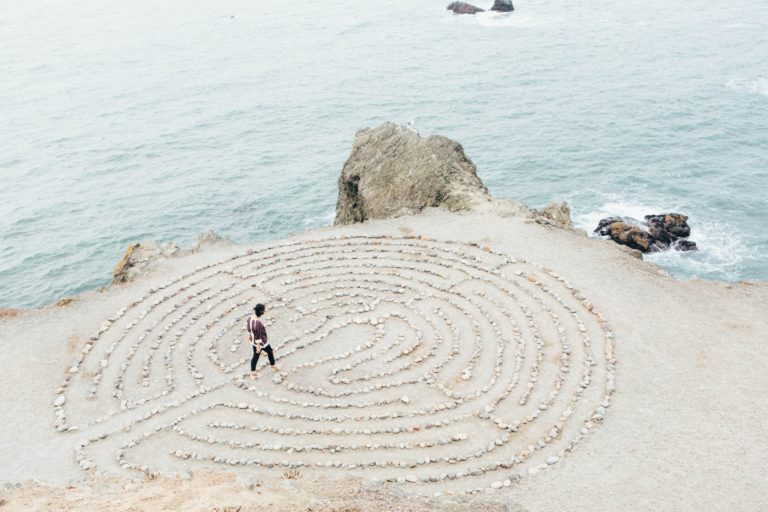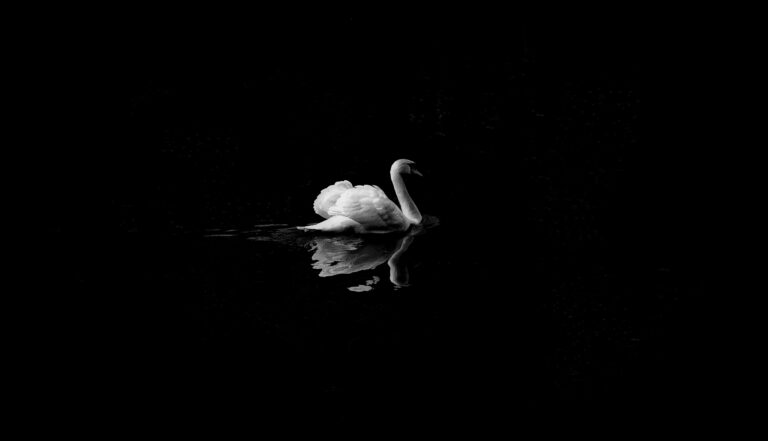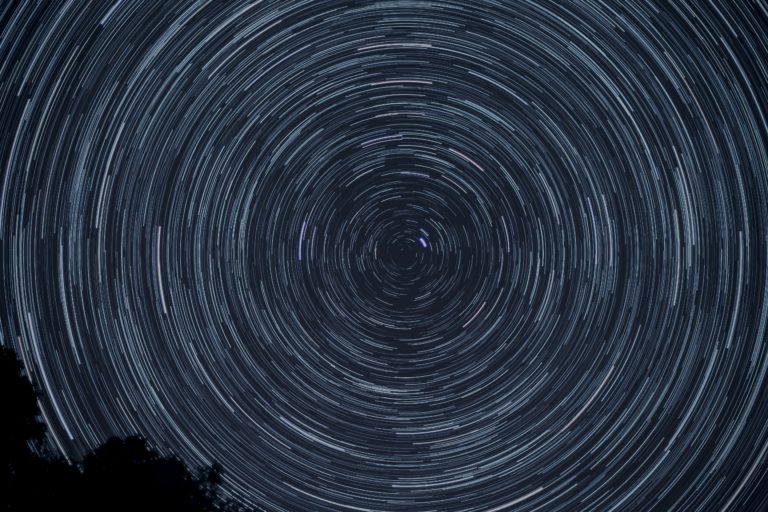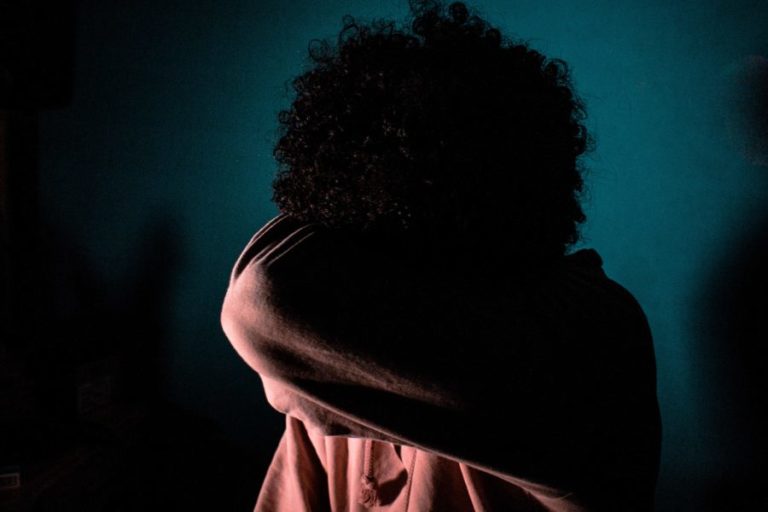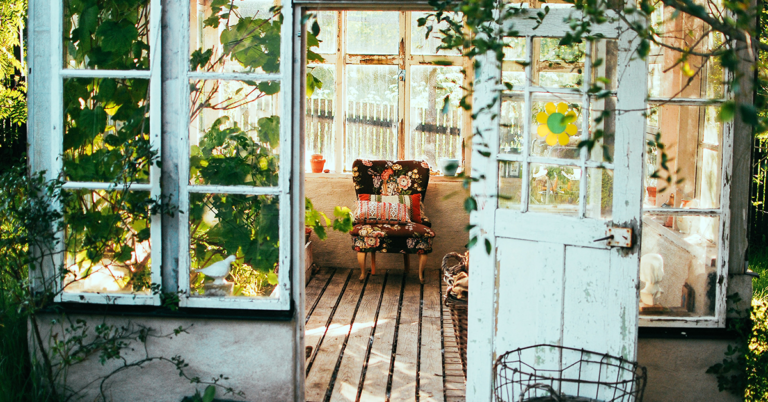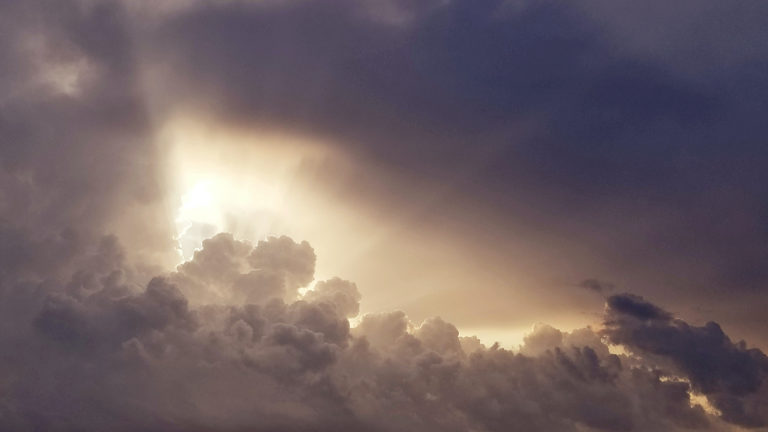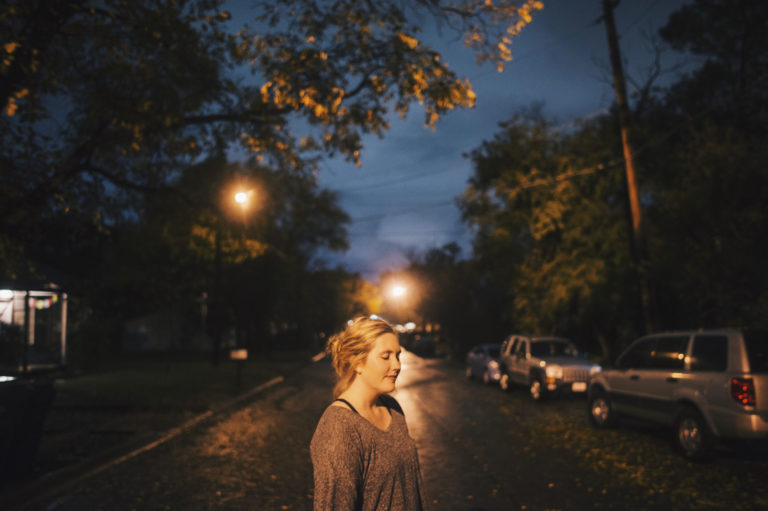Joanna Macy
A Wild Love for the World
A Buddhist philosopher of ecology, Joanna Macy says we are at a pivotal moment in history with the possibility to unravel or create a life-sustaining human society. Now entering her 90s, Macy has lived adventurously by any definition. She worked with the CIA in Cold War Europe and the Peace Corps in post-colonial India and was an early environmental activist. She brings a poetic and spiritual sensibility to her work that’s reflected in her translations of the early-20th-century poet Rainer Maria Rilke. We take that poetry as a lens on her wisdom on the great dramas of our time: ecological, political, personal.

Image by Quan Nguyen, Public Domain Dedication (CC0).
Guest
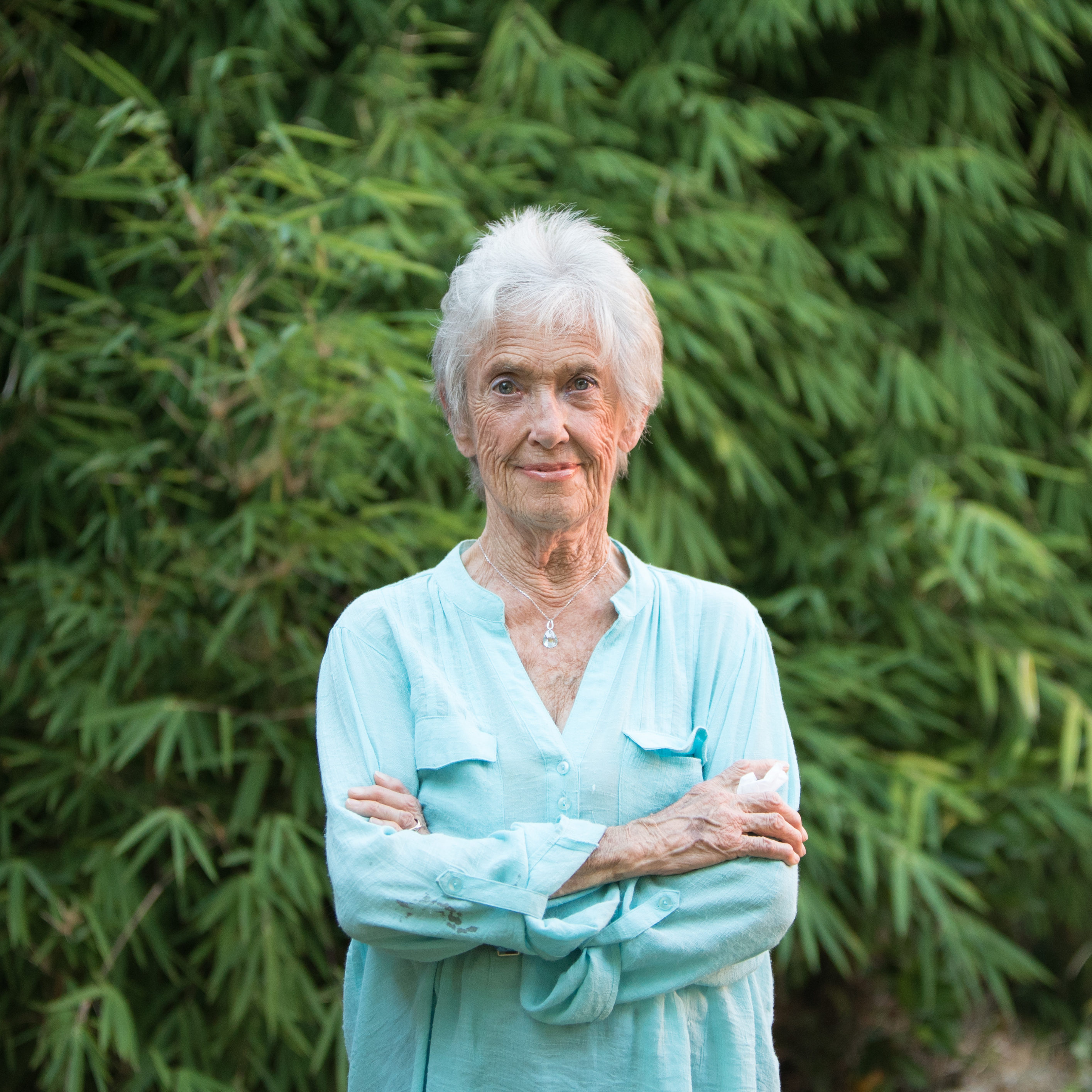
Joanna Macy is a philosopher of ecology and Buddhist teacher, and the root teacher of The Work That Reconnects. She’s the author of many books. Our previous On Being episode with her is “A Wild Love for the World.” That’s also the title of a lovely book of homage to her published in 2020.
Transcript
Krista Tippett, host: I first discovered the philosopher of ecology Joanna Macy as a translator of the poetry of Rainer Maria Rilke. We take that exquisite poetry as a lens on Joanna Macy’s wisdom on the great dramas of our time: ecological, political, personal. Rilke sought the shape of meaning in a now-vanished Central Europe at the turn of the last century. Joanna Macy’s vision took shape in crucibles of the 20th century.
I spoke with her in 2010. Now entering her 90s, Joanna Macy says we are at a pivotal moment in history, with possibilities of unraveling or of creating a life-sustaining human society.
[music: “Seven League Boots” by Zoë Keating]
Joanna Macy: You’re always asked to stretch a little bit more. And actually, we’re made for that. But in any case, there’s absolutely no excuse for making our passionate love for our world dependent on what we think of its degree of health, whether we think it’s going to go on forever. This moment, you’re alive.
Ms. Tippett: I’m Krista Tippett, and this is On Being. Joanna Macy has lived adventurously by any definition. She worked for the CIA in Cold War Germany. Then, as a young mother, she moved with her husband to post-colonial India, where he ran the newly-minted Peace Corps. There, she cared for Tibetan refugees, joining the young, newly exiled Dalai Lama. Later, she became an environmental activist — long before that term entered the global lexicon. Joanna Macy is best known today as a Buddhist, teacher, and scholar.
Ms. Tippett: Just as we start, I would love — and this is where I start with everyone, whatever we’re talking about. I’d like to just ask you to talk a little bit about the spiritual and religious background of your childhood.
Ms. Macy: I grew up in a liberal Protestant family, where the church was very important because my grandfather was a Congregational preacher and so were his father and grandfathers on back. It skipped a generation with my father. At any rate, I was very familiar with the sounds and words and the great feeling of comfort. When we went to church as a child, people said nice things. They didn’t argue, which was what was happening in my home.
And I had, what we could say, a conversion experience, although I was already in the church. But Jesus and God became very personally alive for me when I was just turning 16 at a church camp, and I wanted to give my life to the church. But at that point, Krista, it didn’t even occur to me to enter the ministry. I was that much a child of my era.
So since I didn’t even consider it, I was thinking of other ways, like being a missionary or something. But when I studied and went into studies of biblical history and theology, I began to choke. I found that there was something that I balked at terrifically, which were creedal arguments about items of belief and also any hint of exclusivity that there were people beyond the pale.
And so I walked out when I was 20, and it was a great hole in my life that opened up. It was actually not until 15 years later, when my young family and I were in the Peace Corps in India and I began working with Tibetan refugees — that was the mid-’60s. I found a way of looking at the world through — I became so curious about what made these people so calm and radiant and unstoppable in preserving their tradition and in enjoying life.
Ms. Tippett: I do want to ask you — you mentioned that there was a lot of arguing in your family, and your father was …
Ms. Macy: … tyrannical.
Ms. Tippett: … was tyrannical. And yet, at the same time, you talk about poetry being part of your family, and that was also something that he kept alive.
Ms. Macy: Yes. That’s right, that’s right.
Ms. Tippett: It seems to me that that was part of what could be very broadly described as your spiritual sensibility, also, from an early age. Would you say that?
Ms. Macy: Yes, I would. I would say, also, the summers that I spent at my paternal grandfather’s farm in upstate New York — being in the fields, in the woods, around the barns felt so real and gave me a sense of, the world was very big and wise and intelligent and that I had an appetite to disappear into it.
It was this streak of nature mysticism that made the summer months so much more vivid and real to me than the nine months I spent in New York City going to school. I lived for that. There were hymns of St. Francis and others that — “Oh, yeah. Yeah, this is my father’s world.” That was another hymn I loved that could lift me up. And there was Jesus walking by the shores of Galilee. He was outdoors all the time too.
Ms. Tippett: [laughs] That’s true.
Ms. Macy: [laughs] You don’t see him sitting in a pew or climbing up on a pulpit. He’d climb up on a rock or walk along a sandy beach.
Ms. Tippett: Yeah. As I said a minute ago, I first discovered you and learned about you as a translator of Rilke. I wanted to try to take Rilke as a way into the life you’ve lived, your approach to it, your way of seeing the world and seeing change in the world.
Ms. Macy: What I’d like to speak, then, of — when we were living in Germany. My second son was born there. This was the 1950s. And one day, I walked into a bookstore on Adalbertstrasse near the university, and there on a table was this little cloth-bound book in rag paper. It was exquisite. It was Das Stunden-Buch, The Book of Hours.
I picked it up, and the poem that it opened to was the second poem of the first part, “Ich lebe mein Leben in wachsenden Ringen,” “I live my life in widening circles” — and that something immediately rearranged in the furniture of my mind. I identified completely with it, and I saw — it was just eight lines in that poem — that it could redefine that I was on a spiritual path, that because I wasn’t on the linear road, up the ladder, up Jacob’s ladder to get closer to God, that God had been there all the time, and I was orbiting around him, and that it had been happening, actually, for thousands of years.
Ms. Tippett: So this was the 1950s, right? Is that what you said when you discovered Rilke? At that time, you had a very interesting early adventure with the CIA. Were you doing that at that point?
Ms. Macy: That’s right. See, when I dropped theology and Christianity, my impulse — I had a very strong impulse toward service, so I thought I would serve politically. I got a Fulbright scholarship to the Institut de Sciences Politiques, political science, in France. There, I studied the French Communist Party. And that made me very interesting to CIA. I was all of 21, 22 at the time and still very wet behind the ears. So when CIA dangled a glamorous job in front of my nose, I fell for it and went and worked for them for about two years. But, you know, Krista, I want to read the poem I mentioned.
Ms. Tippett: Oh, good. I’d love for you to read it.
Ms. Macy: So as I stood there having an exciting life but still wishing that I were on a spiritual path — and what was there for me if I couldn’t stomach the church fathers in Christianity and the arcane theological arguments? And then I read this. I’ll say it in English.
“I live my life in widening circles / that reach out across the world. / I may not complete this last one / but I give myself to it. // I have been circling around God, that primordial tower. / I’ve been circling for thousands of years / and I still don’t know: Am I a falcon, / a storm, or a great song?”
The constrictions that my culture had made around the sacred — it just fell away like dried crusts. I felt an excitement about being alive now in a world that itself — yes, of course, it was — my world itself is sacred.
[music: “Stones Start Spinning” by David Darling]
Ms. Tippett: And then when you went to India — had you had an encounter with Buddhism? Did you know much about Buddhism before you …?
Ms. Macy: Not really, no — which was quite wonderful because it was before Buddhism was sweeping the West.
Ms. Tippett: Really came over to the West, right. And you came to Buddhism in India as opposed to discovering it over here.
Ms. Macy: That’s right. I fell in love with these Tibetans who were living in very harsh circumstances up in the foothills of the Himalayas after these incredibly strenuous — and often with loss of life and great danger and sick-making — escapes over the peaks and passes out of Tibet. The way they loved life and the way they loved their tradition in a very open-hearted way, I wanted to know what helped them be like that. That was a turning point in my life.
Ms. Tippett: It’s interesting too that you were drawn to that tradition as a lived expression long before you actually got into the beliefs or the teachings behind it.
Ms. Macy: Yeah, and I was primed for it because I had read Heinrich Harrer’s My Seven Years in Tibet. I had read it in German, its original language. I was going to interpreter’s school in Munich my last year, and I used that text for my simultaneous interpreting exercises. I would read it and render it in English without a pause.
So that book really got into my brain cells, in my head and in my heart, so that when I was actually among the Tibetans and in the presence of His Holiness the Dalai Lama, a young man then, I certainly had a sense of déjà vu.
Ms. Tippett: And as you point out in some of your writing, there are real echoes and resonance between some of Rilke’s poetry about God and Buddhist teachings and notions about reality that are very interesting.
Ms. Macy: Yes, it’s just amazing to me that he refers to, early on in his Stunden-Buch, The Book of Hours — he said, “We must not portray you in king’s robes, / you drifting mist that brought forth the morning.” And then he says, ‘You are like a web’ or ‘you are like a tree’ or ‘you are a forest through which I run,’ or ‘you are a herd of luminous deer’ and ‘I am forest and dark and you run through me.’
He’s using image after image from the natural world to convey that, both the mystery and the beauty and the relationship that we find in the sacred. He addresses this sacred as God, but it’s a God that is very different from the one he had been dragged into Catholic churches with his super-pious mother in Prague as a boy. He hated that. She had him touch the painted wounds on the crucifix to arouse his compassion, and he found all that too repulsive.
But then when he went, interestingly enough, in his early 20s to Russia with his wonderful lover, Lou Andreas-Salomé, who was from St. Petersburg, he encountered Russian spirituality, which is very close to the earth. And that opened up to him a quality of spiritual experience that was very earth-related and vast and timeless.
[music: “Desaparecidos” by Denis Plante]
Ms. Tippett: Here’s one of my favorite Rilke poems about God:
Ms. Macy: “God speaks to each of us as he makes us, / then walks with us silently out of the night. // These are the words we dimly hear: // You, sent out beyond your recall, / go to the limits of your longing. / Embody me. // Flare up like flame / and make big shadows I can move in. // Let everything happen to you: beauty and terror. / Just keep going. No feeling is final. / Don’t let yourself lose me. // Nearby is the country they call life. / You will know it by its seriousness. / Give me your hand.”
[music: “Desaparecidos” by Denis Plante]
Ms. Tippett: I’m Krista Tippett, and this is On Being. Today, with Rilke translator and Buddhist philosopher of ecology, Joanna Macy.
Ms. Tippett: Something that’s very intriguing to me is that you were talking about the environment, and I think maybe — I’m not sure if you called yourself an environmental activist, but being one way before that was something that so many people are talking about. Tell me about how that awakening came in your life.
Ms. Macy: Well, it came about very naturally. I was always responsive to issues when they arose. And then in the ’70s, it became quite vivid for me and quite compelling as through my son — my second son — through a paper he wrote in his environmental engineering course at college that I learned about what nuclear power generation was doing in even the thermal pollution, let alone the radioactive contamination. And so, side by side with him, I stepped into direct activism, going together to occupy the Seabrook reactor before it could open and protesting down at the Nuclear Regulatory Commission.
I learned piles there. And that had a great spiritual teaching for me too, Krista, because it led me into fascination, if not obsession — I’ll say obsession — with long-term radioactive contamination through our processes of making weapons and generating power that insisted that I open my mind to reaches of time that had stretched both my heart and my intellect.
In other words, I realized that we were, through technology, having consequences with — our decisions had consequences or a karma, as we could say, that reached into geological time — and that what in industry and government choices that we make under pressure for profit or bureaucratic whatever, that we are making choices that will affect whether beings thousands of generations from now will be able to be born sound of mind and body.
Ms. Tippett: Something that’s very present for me as I’m reading about you and the passion you’ve had for this for a long time is you also were always very aware of a sense of grief as you realized …
Ms. Macy: Oh, yeah. Grief got me into it.
Ms. Tippett: Yeah. And you really work with people to hold on to that, to take their grief seriously, right?
Ms. Macy: Or not to hold on to it so much as to not be afraid of it, because that grief, if you are afraid of it and pave it over, clamp down, you shut down. And the kind of apathy and closed-down denial, our difficulty in looking at what we’re doing to our world stems not from callous indifference or ignorance so much as it stems from fear of pain. That was a big learning for me as I was organizing around nuclear power and around at the time of Three Mile Island catastrophe and around Chernobyl.
It relates to everything. It relates to what’s in our food, and it relates to the clear-cuts of our forests. It relates to the contamination of our rivers and oceans. So that became, actually, perhaps the most pivotal point in — I don’t know — the landscape of my life: that dance with despair, to see how we are called to not run from the discomfort and not run from the grief or the feelings of outrage or even fear — and that, if we can be fearless, to be with our pain, it turns. It doesn’t stay static. It only doesn’t change if we refuse to look at it. But when we look at it, when we take it in our hands, when we can just be with it and keep breathing, then it turns. It turns to reveal its other face, and the other face of our pain for the world is our love for the world, our absolutely inseparable connectedness with all life.
[music: “Shoe Strings” by David Darling]
Ms. Tippett: I think, again, in even thinking that way, that a poetic mindset is more useful than the fact-based or argument-based way we tend to approach problems culturally, even precisely the same ecological problems.
Ms. Macy: Oh, yeah. That keeps people from even mentioning how distressed they are because they think that they need to have all the facts and figures and statistics to show that they intellectually can master the problem instead of just …
Ms. Tippett: We get overwhelmed by the facts and the figures and the pictures. They are debilitating. They’re paralyzing. As you say, it’s also that we don’t really know how to dwell with grief and turn it into something else. But I think about that a lot as a journalist, as somebody who works in media.
Ms. Macy: It’s a double-edged sword, isn’t it? Because you want to portray — say you’re taking care of your mother, and she’s dying of cancer. You won’t say, “I can’t go in her house or in her room because I don’t want to look at her.” If you love her, you want to be with her. When you love something, your love doesn’t say, “Well, too bad my kid has leukemia, so I won’t go near her.” It’s just the opposite.
Ms. Tippett: What is empowering in moments like that? I wonder if Rilke comes to mind again, of how he was very clear about darkness as a part of life.
Ms. Macy: Yes. There’s a poem that has been — it’s a sonnet and the very last “Sonnet to Orpheus” that has entered my bloodstream that has helped me a great deal in this time. I will say it.
“Quiet friend who has come so far, // feel how your breathing makes more space around you. / Let this darkness be a bell tower / and you the bell. As you ring, // what batters you becomes your strength. / Move back and forth into the change. / What is it like, such intensity of pain? / If the drink is bitter, turn yourself to wine. // In this uncontainable night, / be the mystery at the crossroads of your senses, / the meaning discovered there. // And if the world shall ceased to hear you, / say to the silent earth: I flow. / To the rushing water, speak: I am.”
[music: “New Disaster” by Christopher O’Riley]
Ms. Tippett: After a short break, more with Joanna Macy. You can always listen again, and hear the unedited version of every conversation I have on the On Being podcast feed, wherever podcasts are found.
I’m Krista Tippett, and this is On Being. Today, a conversation with philosopher of ecology and Buddhist scholar, Joanna Macy.
Now entering her 90s, she worked with the CIA in Cold War Europe and the Peace Corps in post-colonial India. She was an environmental activist long before this term entered our cultural vocabulary in any mainstream way. And she brings a poetic and spiritual sensibility to this. It’s reflected in her translations, together with Anita Barrows, of the early-20th-century poet Rainer Maria Rilke. Joanna Macy believes that we are in a moment she calls “The Great Turning” — a transition from society shaped primarily by industrial growth to a society structured to be life-sustaining. She finds nourishment for this vision in Rilke. He also chronicled a turn-of-century, world-altering moment in time.
Ms. Tippett: Talk to me about where these kinds of insights have brought you. You have had this fascinating life, and we talked about the ’50s and ’60s and ’70s. You were always responding and being with what was happening. How do those words of Rilke speak to what’s happening in this early 21st century that we’re in now?
Ms. Macy: Well, from the beginning, Rilke, in his first poems that he stayed loyal to in the Book of Hours, he foresaw — he had this strong inkling — and he gave visions, metaphors, and images to it — that this 20th century that was opening up would be very dark. He didn’t know about the world wars. He didn’t know about the concentration camps, the death camps, the nuclear bombings. He didn’t know about the new diseases and epidemics. But he did sense that. And some of his poems are as if he’s consoling God for what’s happened to his creation. There’s a poem where he says — God becomes the earth itself, and he speaks to the earth: “Du dunkelnder Grund…”
“Dear darkening ground, / you’ve endured so patiently the walls we built, / please give the cities one more hour // and the churches and cloisters two. / And those that labor — let their toils / still hold them for another five hours, or seven, / before that hour of inconceivable terror / when you take back your name/ from all things. // Just give me a little more time! // I just need a little more time. / Because I am going to love the things / as no one has thought to love them, / until they’re real and worthy of you.”
So I feel like that. I’m ready to see. I’m not insisting that we be brimming with hope. It’s OK not to be optimistic. Buddhist teachings say feeling that you have to maintain hope can wear you out. So just be present. The biggest gift you can give is to be absolutely present. And when you’re worrying about whether you’re hopeful or hopeless or pessimistic or optimistic, who cares? The main thing is that you’re showing up, that you’re here, and that you’re finding ever more capacity to love this world because it will not be healed without that. That was what is going to unleash our intelligence and our ingenuity and our solidarity for the healing of our world.
That is what keeps me going, Krista. The Great Turning is a revolution that is underway, the transition to a life-sustaining society — that this is sprouting up in countless ways, new ways of holding the land, new ways of generating energy, new ways of producing food, some of them very old ways that we are going back to, wisdom of the ancestors and of the indigenous people, often, new ways of measuring prosperity and wealth, new ways of handling differences through nonviolent communication, through restorative circles instead of outside the dominant punitive penal system now. There’s a tremendous energy.
Ms. Tippett: Right. When you add all that up, you do see a picture or two.
Ms. Macy: Oh, yeah. Now, something else is going on too, which is the great unraveling under the pressure of the destruction caused by the industrial growth society. The awesome thing about the moment that you and I share is that we don’t know which is going to win out. How is the story going to end?
And that seems almost orchestrated to bring forth from us the biggest moral strength, courage, and creativity, I feel. Because when things are this unstable, a person’s determination, how they choose to invest their energy and their heart mind can have much more effect on the larger picture than we’re accustomed to think. So I find it a very exciting time to be alive, if somewhat wearing emotionally. [laughs]
Ms. Tippett: [laughs] Is there any Rilke that comes to mind on these big ideas?
Ms. Macy: Oh, yeah. Yeah.
Ms. Tippett: Tell me what comes to mind.
Ms. Macy: “All will come again into its strength.” Let me see if I can find that.
Ms. Tippett: I’m trying to remember — I’ve been reading my — pulling out my Rilke as I was planning to read you. There were a couple of lines that just were so haunting to me. I can’t find them. It’s something about — it’s the end of a poem. And it’s something about — ‘in the ephemeral nature of things is their very fragrance.’ Do you know what I’m talking about?
Ms. Macy: Yes.
Ms. Tippett: Which sounds so much like he was a Buddhist. [laughs]
Ms. Macy: [laughs] Yeah.
Ms. Tippett: But it was so beautiful, so beautiful.
Ms. Macy: This runs through Rilke’s “Sonnets to Orpheus.” “Song itself cannot happen without time, without the voice rising and falling away” — and I love it that you remembered that line — “For is not impermanence the very fragrance of our days.”
Ms. Tippett: “Is not impermanence the very fragrance of our days.” Right.
Ms. Macy: Yeah.
[music: “Armellodie” by Chilly Gonzales]
Ms. Tippett: I just want to underline the connection that you repeatedly make that I think might be counterintuitive. You talk about spirituality, and you are also always equally talking about — these are some phrases from your writing that echo things you said: Your wild love for the world or even an erotic connection with the world — that those two things go together for you.
Ms. Macy: Yeah. That’s right. World is lover. World is self. And it’s OK for our hearts to be broken over the world. What else is a heart for?
There’s a great intelligence there. We’ve been treating the Earth as if it were a supply house and a sewer. We’ve been grabbing, extracting resources from it for our cars and our hair dryers and our bombs, and we’ve been pouring the waste into it until it’s overflowing.
But our Earth is not a supply house and a sewer. It is our larger body. We breathe it. We taste it. We are it. And it is time now that we venerate that incredible flowering of life that takes every aspect of our physicality.
I’m looking at my hand right now as we talk. It’s got a lot of wrinkles, but it’s linked to hands like this back through the ages. This hand is directly linked to hands that learned to reach and grasp and climb and push up on dry land and weave reeds into baskets, and it has a fantastic history. Every particle and every atom in this hand goes back to the beginning of space-time. We’re part of that story.
Ms. Tippett: That actually gets at something I wanted to ask you about your sense of time, but I came at that with a much more narrow imagination. I was thinking about the history you’ve seen — the political history you’ve seen, how that India you lived in the 1960s is now transformed. In many ways, it’s a rising star in a globalized economy. How that East Germany where you watched the uprising in Hungary, how the Berlin Wall fell …
Ms. Macy: You have a globalized culture extending over all of it with a monoculture, in a way, that is wiping out ancient cultures and languages.
Ms. Tippett: Is that what you see?
Ms. Macy: Yeah, that’s what I see. At the same time, there’s this incredible linking. And there is, right here in my neighborhood, a group of young women who have created an organization where they work on appropriate technology with women in India and in Africa.
Ms. Tippett: Do you have the sense — you’re 81; I’m 49. But I have a sense also that there’s an intuition in the blood and bones of young people, of new generations coming up, that they inhabit this reality, right? That they know it in a way that I never will. [laughs] I wonder …
Ms. Macy: It’s amazing.
Ms. Tippett: You have grandchildren. Maybe you …
Ms. Macy: And they’re able to look into the face of some pretty awful political corrupt machinations or what-have-you that would get me frothing with righteous indignation, and they smile and shrug and say, “What do you expect?” And then they go and do what needs to be done.
Ms. Tippett: [laughs]
[music: “My Ship” by The Instruments]
Ms. Tippett: I’m Krista Tippett, and this is On Being. Today, with Rilke translator and Buddhist philosopher of ecology Joanna Macy.
Ms. Tippett: I was noticing one of your most recent books, I think, is more Rilke, which you titled In Praise of Mortality. You wrote, “Rilke invites us to experience what mortality makes possible. It links us with life and all time.” And you went on, “Ours is the suffering and ours is the harvest.” I wonder, at 81, is there wisdom you have about that?
Ms. Macy: I’m very grateful for Rilke because I signed the contract to prepare with Anita the Year with Rilke just weeks before the sudden death of my husband of 56 years. In that devastation and loss, I had to work on this book, and I had to be with Rilke. I couldn’t say, “Oh, I’m too weak. Oh, let me mourn. Oh, it’s too much.” I just had to pull up my socks and do it. And what a reward. It was as if I were being dipped in beauty.
And then one day, I found this quote. I put it in the book because he says a lot about death and the way he faced his death. He did not take solace in an afterlife, so he just saw, death belongs to life and can make us more alive. But, Krista, listen to this. I put it on February 27th.
“The great secret of death, and perhaps its deepest connection with us, is this: in taking from us a being we have loved and venerated, death does not wound us without, at the same time, lifting us toward a more perfect understanding of this being and of ourselves.”
Get a load of that.
Ms. Tippett: They’re beautiful words. Were you really able to inhabit those words after your husband had died?
Ms. Macy: Oh, yes. Well, neither of us thought we were immortal. [laughs] We knew one would go first. I’m everlastingly grateful that we were in love and stayed in love. Particularly, it was like falling in love all over again in our later years, so there was a lot of cherishing.
But I found that that quote that I just read you — and it’s really engraved in the inside of my head — is true. It’s true, and that’s why we’re changing all the time. He’s part of my world now. You become what you love. Orpheus became the world that Rilke sang to, and my husband, Fran, is spread out in this world that he loved.
You’re always asked to sort of stretch a little bit more. But actually, we’re made for that. There’s a song that wants to sing itself through us, and we’ve just got to be available. Maybe the song that is to be sung through us is the most beautiful requiem for an irreplaceable planet or maybe it’s a song of joyous rebirth as we create a new culture that doesn’t destroy its world.
But in any case, there’s absolutely no excuse for making our passionate love for our world dependent on what we think of its degree of health, whether we think it’s going to go on forever.
Those are just thoughts anyway. But this moment, you’re alive. So you can just dial up the magic of that at any time.
[music: “Different Kinds of Happy” by Mark Orton]
Ms. Tippett: Here, in closing, is a poem from Rilke’s Book of Hours, which Joanna Macy translated with Anita Barrows and subtitled “Love Poems to God.”
Ms. Macy: “You are not surprised at the force of the storm— / you have seen it growing. / The trees flee. Their flight / sets the boulevards streaming. And you know: / he whom they flee is the one / you move toward. All your senses / sing him, as you stand at the window. // The weeks stood still in summer. / The trees’ blood rose. Now you feel / it wants to sink back / into the source of everything. You thought / you could trust that power / when you plucked the fruit: / now it becomes a riddle again / and you again a stranger. // Summer was like your house: you know / where each thing stood. / Now you must go out into your heart / as onto a vast plain. Now / the immense loneliness begins. // The days go numb, the wind / sucks the world from your senses like withered leaves. // Through the empty branches the sky remains. / It is what you have. / Be earth now, and evensong. / Be the ground lying under that sky. / Be modest now, like a thing / ripened until it is real, / so that he who began it all / can feel you when he reaches for you.”
[music: “Best Unsaid” by Michael Brook]
Ms. Tippett: Joanna Macy’s books include Active Hope: How to Face the Mess We’re in Without Going Crazy. Her wonderful books of Rilke translation, together with Anita Barrows, are Rilke’s Book of Hours: Love Poems to God, A Year with Rilke, and In Praise of Mortality. Here, she is reciting one last Rilke poem for us. You can listen again to all the poems Joanna Macy recited this hour at onbeing.org.
Ms. Macy: The poem for today in A Year with Rilke is “The Swan.” When I opened it this morning and saw that, I was delighted because when I’ve seen swans, they always make me think of Fran. And it’s also about death and about how not to be afraid of death.
“This laboring of ours with all that remains undone, / as if still bound to it, / is like the lumbering gait of the swan. // And then our dying — releasing ourselves / from the very ground on which we stood— / is like the way he hesitantly lowers himself // into the water. It gently receives him, / and, gladly yielding, flows back beneath him, / as wave follows wave, / while he, now wholly serene and sure, / with regal composure, / allows himself to glide.”
As I read that sonnet this morning, I thought of Fran. And I thought, “Oh, look at you getting to have some regal composure while I have to deal with a broken car, with books I have to cull out, with repairs to the heating system.” [laughs]
Ms. Tippett: [laughs]
Ms. Macy: There he goes, regal composure.
[music: “Manifesto” by Chilly Gonzales]
Staff: On Being is Chris Heagle, Lily Percy, Maia Tarrell, Marie Sambilay, Erinn Farrell, Laurén Dørdal, Tony Liu, Bethany Iverson, Erin Colasacco, Kristin Lin, Profit Idowu, Eddie Gonzalez, Lilian Vo, Lucas Johnson, Damon Lee, Suzette Burley, Katie Gordon, Zack Rose, and Serri Graslie.
[music: “Oregano” by Chilly Gonzales]
Ms. Tippett: Special thanks this week to HarperOne for permission to use poetry from the collection A Year with Rilke, translated and edited by Joanna Macy and Anita Barrows.
The On Being Project is located on Dakota Land. Our lovely theme music is provided and composed by Zoë Keating. And the last voice that you hear singing at the end of our show is Cameron Kinghorn.
On Being was created at American Public Media. Our funding partners include:
The Fetzer Institute, helping to build the spiritual foundation for a loving world. Find them at fetzer.org.
Kalliopeia Foundation, working to create a future where universal spiritual values form the foundation of how we care for our common home.
Humanity United, advancing human dignity at home and around the world. Find out more at humanityunited.org, part of the Omidyar Group.
The Henry Luce Foundation, in support of Public Theology Reimagined.
The Osprey Foundation — a catalyst for empowered, healthy, and fulfilled lives.
And the Lilly Endowment, an Indianapolis-based, private family foundation dedicated to its founders’ interests in religion, community development, and education.
Books & Music
Recommended Reading
The On Being Project is an affiliate partner of Bookshop.org and Amazon.com. Any earnings we receive through these affiliate partnerships go into directly supporting The On Being Project.















